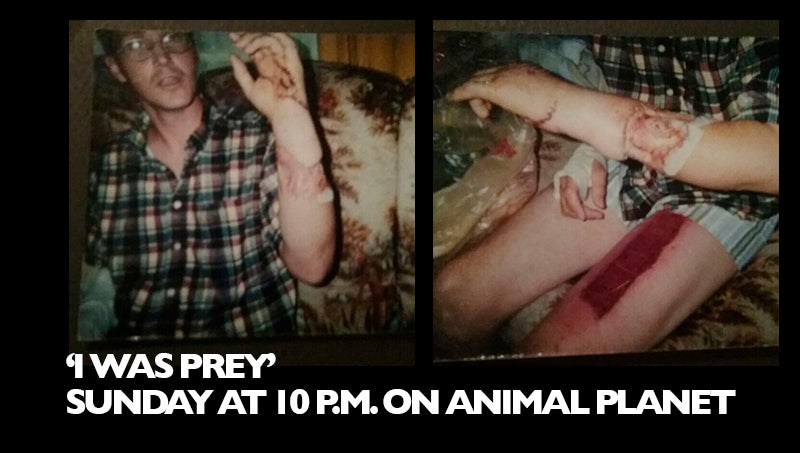Chocowinity man recounts alligator attack to Animal Planet
Published 8:17 pm Thursday, July 5, 2018

- AFTERMATH: Wayne Petteway’s injuries took a total of 17 surgeries and many years to heal after an alligator attacked him in the New River 17 years ago. He shares his story Sunday on “I Was Prey,” a show on Animal Planet. (Wayne Petteway)
With an average bite force of 2,125 pounds per square inch, it’s rare that many live to tell about an alligator attack. However, one Chocowinity man did.
Wayne Petteway’s story of how he survived his encounter with an alligator will be told Sunday night on “I Was Prey,” a show on Animal Planet. The episode will air at 10 p.m.
Petteway decribes the attack as him being in “the wrong place at the wrong time” 17 years ago, at Camp Lejeune in Jacksonville. Then, civilians were allowed to use the Old Towne Pointe area for recreation, and Petteway was spending some time on the New River with his brother and sister-in-law.
“When I first pulled up, I saw the alligator, but I’d seen them down there my entire life,” Petteway said.
American alligators are naturally shy and secretive and rarely pose a threat to humans, according to the North Carolina Wildlife Resources website. But there’s a reason why it’s against the law to feed alligators in the state of North Carolina: “They can become a problem when they are fed by people, which causes them to associate humans with an easy meal,” the website reads.
According to Petteway, that’s what happened. A resident of Jacksonville at the time, he said he’d heard about personnel feeding alligators at the Officers Club on the base, but didn’t think twice about hanging out on the river. That changed when Petteway’s brother, Joel, asked him to help retrieve two crabpots he’d set the night before, about 75 yards offshore.
“He said, ‘Hey, man, help me get those crabpots in.’ I just got a bad feeling in my stomach,” Petteway said. “We got about halfway out, and I heard a splash, and my brother’s wife started screaming at us.”
The 11-foot alligator went after Joel Petteway first, but, separated by about 50 yards, Wayne Petteway began splashing water to distract the reptile. It worked and headed for him, he said. Joel Petteway then did the same, splashing and distracting. The brothers, alternately targeted by the alligator, splashed back toward shore and got about five yards out, Wayne Petteway said, when the alligator caught him by the left arm.
“It picked me up off my feet and put me underwater and rolled me,” he recalled.
He said he struggled to break free, but believes it was God’s intervention that ensured his survival.
“The Spirit of the Lord whispered in my ear and told me to be still,” Petteway said. “It floated me up to the surface because I was so still.”
Thinking its prey was dead, the alligator released Petteway, but latched on to both of his arms again as he tried to get away. It would take his brother and sister-in-law to beat the reptile off. By then, Petteway’s left arm was only attached by tendons and its major artery. Even though he was in shock, his National Guard training kicked in: a tourniquet was applied; his arm iced and, seven miles away from the main road, they loaded him in the back of the truck to take to the hospital, he said. On the way, they ran into military troops training, and a military ambulance took him the rest of the way. From Onslow Memorial Hospital he was life-flighted to Duke University Hospital, Petteway said.
“In 17 days at Duke, I had seven surgeries,” Petteway said, adding that he went through another 10 in the first several months.
Unable to use either arm for months, Petteway had a long road to recovery. Today, he has 40-50 percent use of his left arm.
“What keeps me going strong is a good support system,” Petteway said.
Petteway shared his story with Animal Planet as a warning of what could happen if you’re not aware of your surroundings.
“One of the biggest things I did that for is maybe it will save a life; make people aware of the danger that surrounds them,” Petteway said. “I don’t have anything against alligators. The alligator was doing what alligators are supposed to do. … I’m definitely against people feeding alligators. It’s not fair — they associate a hand with food.”
Eastern North Carolina’s growing alligator population also plays a part in Petteway’s willingness to share his story, he said. American alligators are considered an endangered species, and individual populations can be wiped out quickly, according to a 2015 study released by N.C. State University. However, the same study determined the state’s population was stable or growing and calls to Wildlife Resources to report alligator sightings more than doubled from 2015 to 2017. This year, the state opened up a very limited hunting season on alligators, from Sept. 1 to Oct. 1, but local governments must apply to be permitted. So far, only Lake Waccamaw has taken the state up on its offer.
“They’re moving up in the creeks in New Bern, and that’s getting pretty close to home. They’re natural habitats are being destroyed,” Petteway said. “I really feel like, due to overcrowding with them, I think there should be a season on them.”





